The power and possibility of change are core beliefs that we cherish at Homeward Bound. Spring makes it especially easy to find inspiration in change as the natural world’s momentum harnesses growth for another season.
Dear friends to the end... of homelessness
Without a place to call home, the potential for change and growth fade to the realm of distant possibility. Last year we joined with community collaborators to celebrate two amazing buildings created for individuals to plant their roots and begin to bloom. La Casa Buena in Corte Madera and Jonathan’s Place in San Rafael transformed tired structures into comfortable homes for 50 people who, collectively, had been unhoused for well over 300 years!
Our gratitude to the many partners who made this possible matches the gratitude we hear from residents who feel relieved, safe and finally at home. And we’re grateful to be starting again, this time with the goal of ending veteran homelessness in Marin! Construction has begun next to our headquarters at Novato’s former Hamilton Air Force Base on a building to house 24 veterans who, with your help, will have a place to call home.
We’re also growing the opportunities provided at Fresh Starts Culinary Academy, where trainees build knowledge and skills to imagine and activate new careers in the food industry. Adding to our training staff this year allows us to embed more learning in our kitchens for graduates who become transitional employees as they deepen their training. We’re thrilled to welcome Alli, Matt and Jasmine as coaches and mentors – read more about our training program on page 4.
Our compassionate supporters ensure we can continue to live up to our name as ‘Homeward Bound.’ For nearly 50 years, we have evolved programs and strategies in service to the whole community as we strive for our common goal to end homelessness. Thank you for your vital and continued support!
Corte Madera Program Nears One-Year Anniversary
The one-time motel transformed as La Casa Buena held an open house last May to celebrate the end of our major renovations. This spring, a new community has taken root.
Eighteen people ranging from 20 to 78 years old have moved into the studio apartments next to Marin Joe’s restaurant in Corte Madera. All had suffered lengthy periods of being unhoused.
“It’s a beautiful thing to watch them move in and be able to feel safe and secure,” says Senior Program Coordinator Alicia Slavich, whose office adjoins the community room at La Casa Buena.
“Here I’ve got everything I need,” says Albert G., an artist who lived for years in a van before moving to La Casa Buena. “It’s been a great place for me.”
Local groups have embraced the program, with Congregation Rodef Sholom bringing a monthly brunch and Girl Scout Troop 10638 decorating a Christmas tree in the community room at La Casa Buena.
Our residents received holiday presents from Corte Madera neighbors, while photographer Lea Del Pomo led a workshop that offered disposable cameras to everyone for a creative project.
“There’s an active volunteer oversight committee who offered connections to local services,” says Mary Kay Sweeney, Co-Chief Executive Officer. “The entire community of Corte Madera has been so welcoming and supportive.”
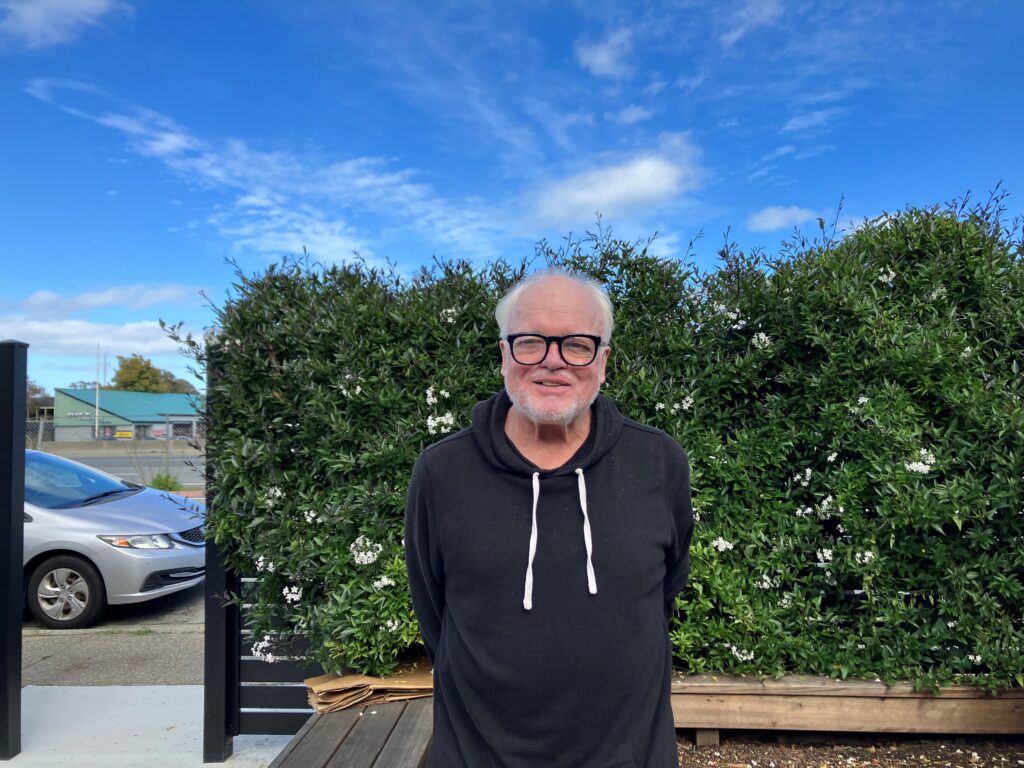
Veteran settles into home in Corte Madera
Stephen M. has been a vital part of home life for clients as a live-in caregiver. Yet that path never led the U.S. Army veteran to a long-term home of his own.
“I felt good that I was providing a service, but it’s a full-time physical job,” he says. “Eventually, down deep, you’re thinking ‘When do I have a chance to do something for myself?’ “
Stephen moved last August to La Casa Buena, our permanent supportive housing program in Corte Madera. He enjoys the quiet space for reading, writing and participating in online forums on topics from politics to quantum physics.
Now 75 years old, he explains that health issues brought him to a realization that he couldn’t return to strenuous work like caregiving.
“I love it here. I go for health walks. I like the location.”
Raised in San Francisco, Stephen still remembers the “Dear Citizen” letter that drafted him into the U.S. Army in 1968. “The Vietnam War was in full swing. Luckily I ended up in Germany instead,” he says.
Though trained as an artillery surveyor, he recalls spending most of his time shoveling coal into furnaces. “I was always in conflict with authority. I was part of a protest generation,” Stephen says.
After his service, he worked as a janitor at Marin General Hospital and studied literature at College of Marin with the idea of becoming a writer.
His career as a caregiver started with several years in convalescent hospitals, then transitioned to providing in-home care. In that role, he lived with three different clients in Marin and accompanied one on business trips around the country.
When his final client passed away, Stephen tried driving a taxi but says the earnings weren’t enough to keep him going financially. At one point, Stephen says, he spent two years sleeping in parks and “staying under the radar.”
He first reached out to Homeward Bound of Marin in 2010, when he’d exhausted his minimal savings.
“At that point, I hadn’t thought about my military service for a long time. Most of my life, I had no insurance,” says Stephen, who learned about his veteran’s medical benefits and other services at Homeward Bound.
Later he received a cancer diagnosis and needed immediate hospital care. He also has undergone two knee replacements, learned to monitor his diabetes and received help for depression.
“If it wasn’t for the staff at Homeward Bound, I wouldn’t be here,” Stephen says. “I’m very indebted and humbled by the support that’s been given to me. I’m grateful to be alive.”
Culinary Projects Expand with New Funding
Culinary training and support services to enter the workforce grew this year with help from a $750,000 grant from California’s “Breaking Barriers Initiative.”
The state program awarded the funds to strengthen our success at Fresh Starts Culinary Academy in providing employment training and creating career paths in the dynamic food industry.
With the grant, Homeward Bound has added two positions in the award-winning program that opened in Novato in 2001. The 10-week training in core culinary and customer service skills is available at no charge to eligible students in our programs and the wider community.
“Homeward Bound is thrilled and grateful to expand training options for our culinary students. We’ve enhanced the training and provide even more amazing, collaborative opportunities to grow in the industry,” says Mary Kay Sweeney, Homeward Bound’s Co-Chief Executive Officer.
The training team has added Chef Instructor Matthew Shapiro to strengthen coaching for culinary graduates working in six-month transitional jobs in our kitchens. Culinary Trainer Jasmine Howell also joined us, adding baking skills to the avenues that trainees can explore.
Transitional employees work in our social enterprise businesses, including The Key Room event venue and Wagster Treats premium dog biscuits. They also work at Fresh Starts Chef Events, the monthly celebrity chef evenings at The Key Room.
As transitional employees, graduates can deepen their skills and prepare more fully to enter the mainstream workforce while contributing in full-time, paid positions.
“While our core training acts as workforce preparation, the transitional roles now provide more than on-the-job experience. We’re creating a culture of learning that continues daily for the team,” says Paul Fordham, Co-Chief Executive Officer.
The Fresh Starts program also added a partnership with Community Action Marin to provide bilingual financial literacy training and professional development coaching for transitional employees, as well as outreach support to future students.
“Our collaboration will focus on employment readiness and job placement to ensure graduates are successful in securing meaningful employment once they complete the program,” says Heather Bettini, a senior director at Community Action Marin.
Homeward Bound maintains wraparound support services for trainees, including transit vouchers, resume help and job placement support, housing navigation, and links to community resources for healthcare, mental health, childcare or other needs.
Fresh Starts Culinary Academy offers four 10-week sessions per year and expects to serve approximately 50 students plus transitional employees this year. In 2022, 82% of trainees were unhoused and 85% of graduates secured employment within 30 days of completing the course.
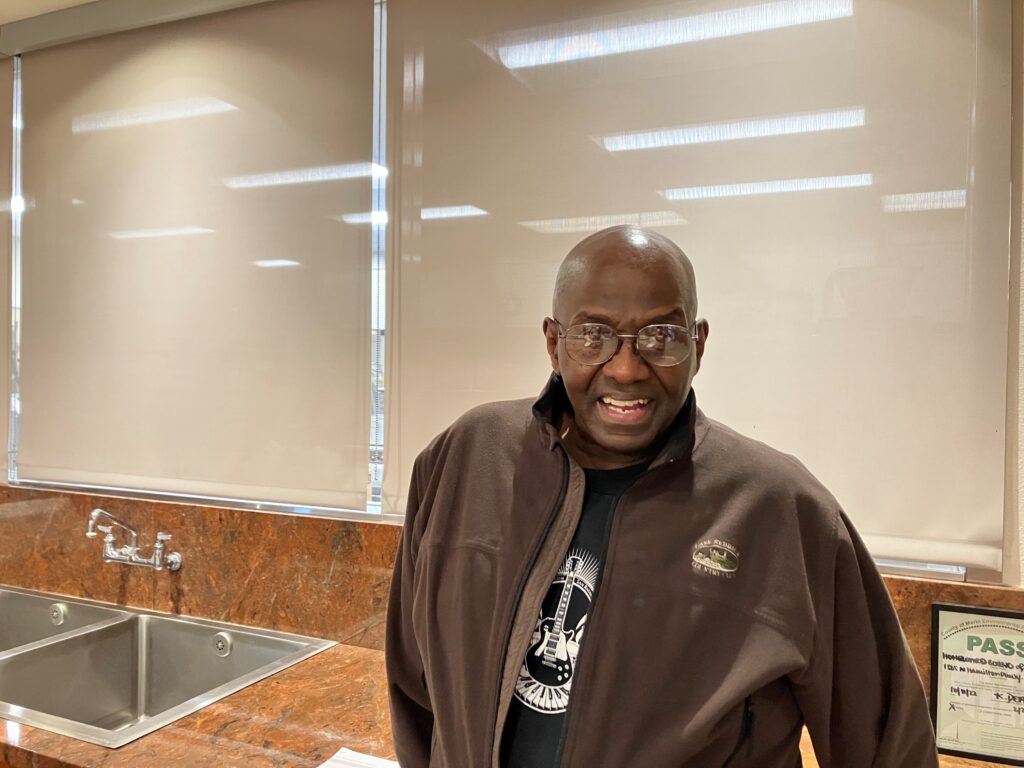
Taylor Comes Full Circle with a Full Plate
More than a decade has passed since Anthony Taylor – known to all as “Taylor” – graduated from Fresh Starts Culinary Academy. This spring, he appeared as the guest speaker at graduation for six trainees.
“It’s really full circle for me. My life has changed so dramatically,” says Taylor, who lives in Mill Valley and juggles work in his independent catering business with a part-time position at Helen Vine Recovery Center in San Rafael.
He enrolled in Fresh Starts training while a resident in our shelter. Though he loved cooking and had worked in kitchens, Taylor says, his lifestyle never settled into a sustainable pattern.
“Bouncing around and living out of a suitcase didn’t work well for me,” says Taylor, who feels strong as he goes toward seven years of sobriety. “There were days I let people down, myself included.”
He settled into recovery at the Helen Vine center, then began volunteering there in 2017. Eventually the center offered him a staff role and Taylor began training as an addiction counselor. Now he works two days a week there and leads support groups on Wednesdays.
“It’s like a mirror. It’s intimidating and empowering in a way,” Taylor says. “Whether they’ve been there a day or a month, I listen to what they have to say. It’s important to see someone that takes them seriously.”
He finds each person’s story offers him an added perspective. “I take it all into everyday life. It keeps me sober. It makes me a better employee. It makes me a better person,” he says.
Training at Fresh Starts also gave him lasting inspiration. He recalls Executive Chef Jacques Kirk as his model for culinary excellence and the kitchen teamwork as valuable learning, along with working at catering events in The Key Room.
“It was very impactful. I had the opportunity to direct staff at events and learn to organize the service,” Taylor says.
A self-described ‘people person,’ he works with caterers to hire staff and lead service at events from exclusive gatherings to parties with hundreds of people. Recent gigs have been in Pacific Heights, Treasure Island and Silicon Valley.
“Being housed has been the key to maintaining my sobriety and moving forward,” Taylor says. “I really value Homeward Bound for giving me some tools so I could take advantage of my opportunities.”
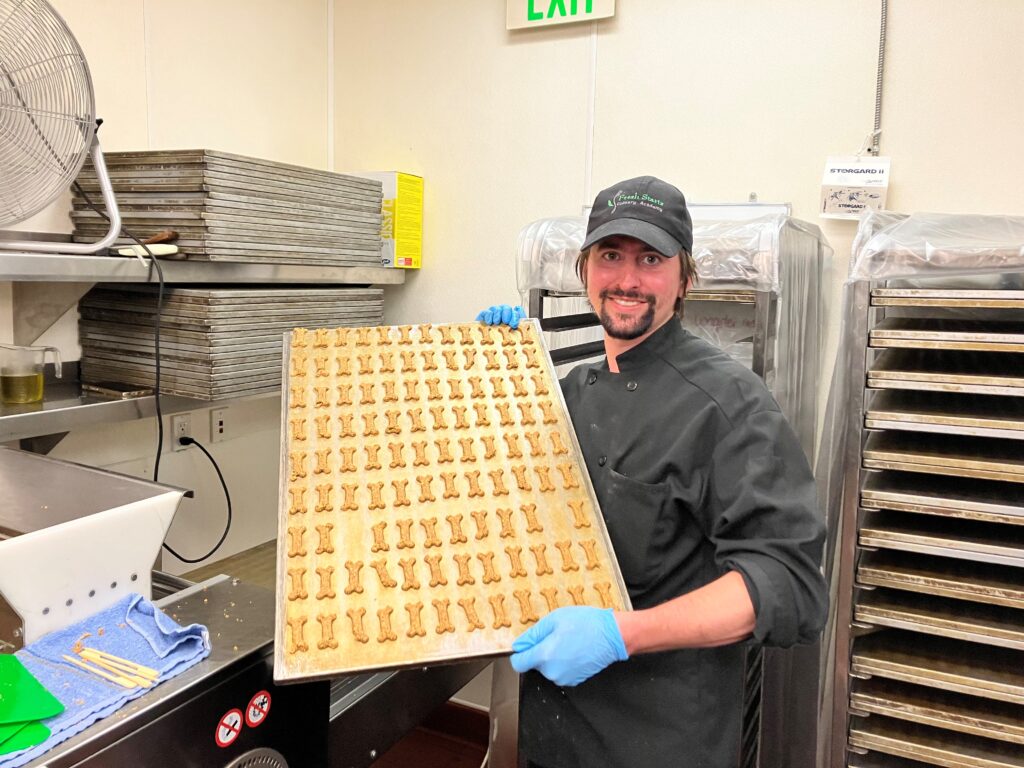
Wagster Kitchen Helps Austin Bake New Future
Becoming part of Fresh Starts Culinary Academy pushed Austin outside his comfort zone. “I’m no cook. I absolutely didn’t think I could do it at first,” he says.
Austin started the course after months of being unhoused and “in a dark place mentally,” he says. He signed up with encouragement from Fresh Starts graduate Janin Harmon, who heads the kitchen at the Petaluma shelter where Austin stayed for a time.
Support from the chef instructor and staff helped him feel more relaxed, focus on the daily learning and graduate last October.
“I’m so thankful for it. I got to learn a skill that I’ll have for the rest of my life,” Austin says.
He recalls feeling relieved to arrive at Homeward Bound of Marin knowing that he had a goal to complete the training. Austin still carries distinct memories of his first winter outside, when rain drenched him for days with no way to get dry.
“I woke up one day and thought, ‘I’m not happy with myself. I need to do something,’ I didn’t want to make a career out of homelessness,” he says.
After graduating from Fresh Starts, Austin accepted a transitional position in our kitchen and gladly took up the chance to train as a baker with Wagster Treats. He moved in March to the Next Key Apartments, our transitional housing program in Novato.
He likes the feeling of progress in mixing, rolling out and baking our premium dog biscuits, especially since his childhood in Rohnert Park included several dogs as well as three siblings.
“It just feels good to be here,” he says. “We have some responsibility as a team and I like the people that I work with. It’s nice to know you worked hard at the end of the day.”
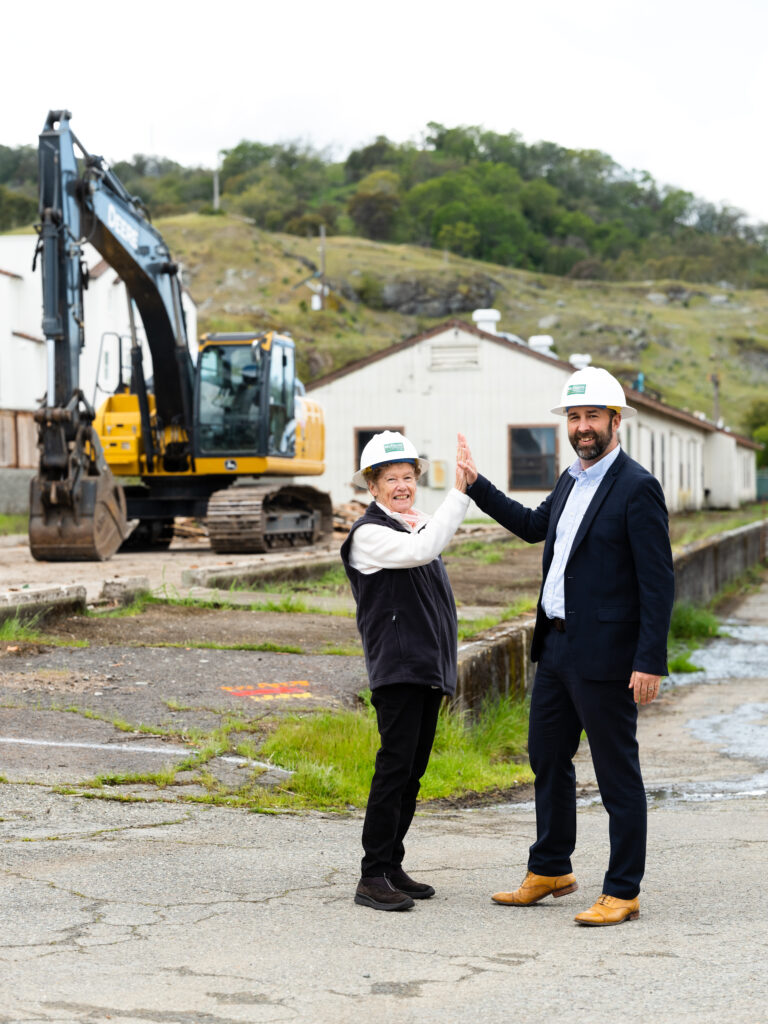
We’re Making Way for Veterans to Move Home
With your support, we can make history in Marin County by ending veteran homelessness.
Along with spring sunshine, we welcomed big machines to clear the way for ending veteran homelessness in Marin County!
Our project will create a new supportive housing program where 24 former service members can end the struggles of living without a roof over their heads. We expect to complete construction next year.
Based on current knowledge of veterans in Marin, this program next to our Novato headquarters has the potential to end homelessness for all former service members in our community. Marin County would be the second in California to achieve this success.
“We’ve been laying the pieces in place for this important project for 18 months,” says Mary Kay Sweeney, our Co-Chief Executive Officer. “It’s a joy and a relief to see the skies finally clear and get started.”
Rain made the start date for demolition a moving target, but planning, analysis and a biweekly meeting for the construction team took up countless hours in recent months.
Among the topics: tests for asbestos, monitoring to detect bat colonies (there were none) and analyzing options to control site runoff. Homeward Bound of Marin also engaged the Federated Indians of Graton Rancheria to monitor earth movement for any cultural resources or remains.
Though opening is months away, our team already has chosen details like flooring and countertop materials for the new apartments.
“The work that’s just started goes beyond the veterans housing,” Mary Kay adds. “We’re completing all the groundwork and infrastructure for the footprint of the whole site.”
An additional 26 units will be built in a second phase for families and adults transitioning into the workforce. That phase includes a production kitchen to support Homeward Bound’s social enterprises, which employ homeless and low-income adults.
Finishing the 24-unit building next year extends the specialized services for veterans that Homeward Bound has provided for more than 20 years in partnership with the U.S. Department of Veterans Affairs.
We served 54 veterans last year across our programs, which include an onsite office for social worker Cynthia Gray and 12 beds reserved for former service members at the New Beginnings Center.
Important seed funding for the veterans housing includes a $4 million allocation in the California state budget; $3 million from the state’s Veterans Housing and Homelessness Prevention Program; $2 million from the County of Marin, and $2.2 million from Marin Community Foundation.
The project also has received a federal budget allocation of $750,000 and a significant $400,000 grant from the Home Depot Foundation in addition to generous grants and contributions from our community of supporters.
With your support, we can make history in Marin County and end the crisis of homelessness in Marin for everyone who honored our freedoms with their military service!
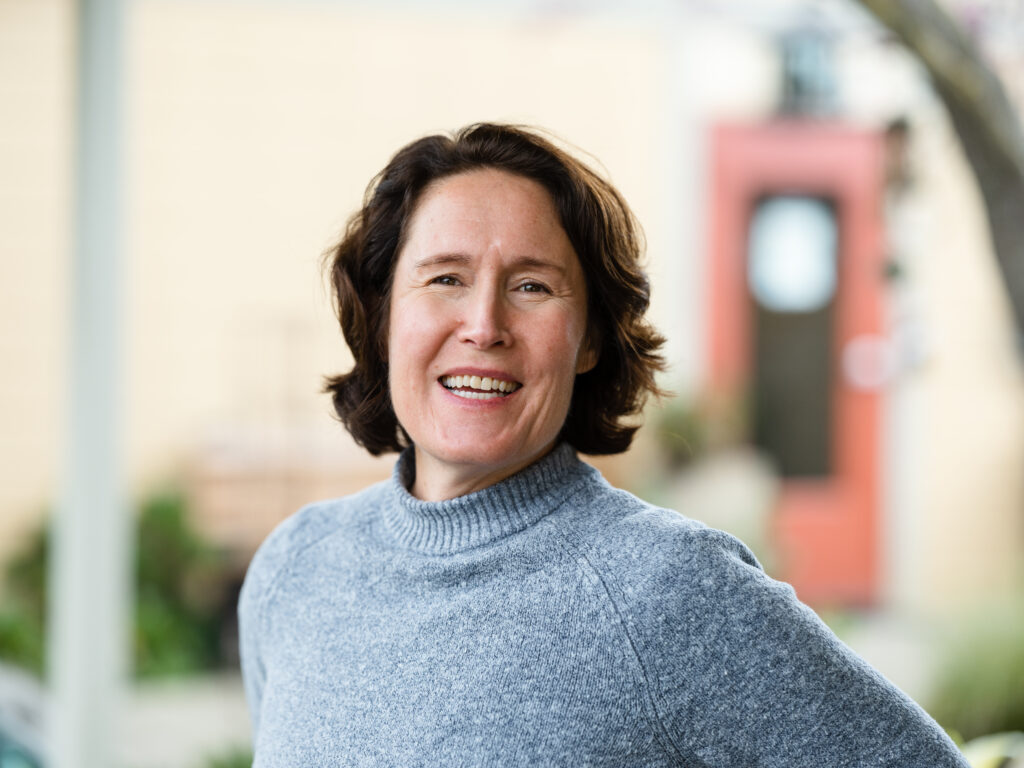
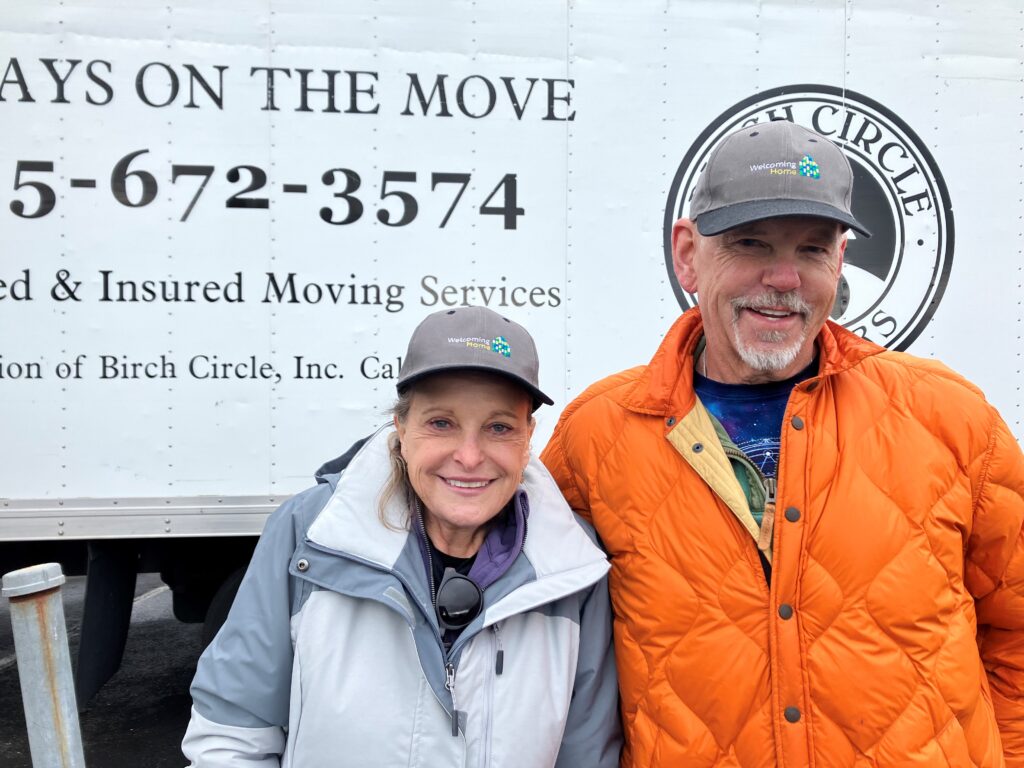
Community Partner Spotlight: Welcoming Home
Turning a set of rooms into a home requires more than just keys. That’s where the nonprofit Welcoming Home made its niche.
“It struck us that people, especially in Marin, regularly turn over their furniture,” says Marsha Roberts, who founded the organization with husband Greg Hansen after volunteering with a similar group based in the East Bay.
At the same time, she notes, programs that help unhoused families often have no funding for furniture and household goods.
Welcoming Home now serves about 45 families annually in Marin and Sonoma counties, all referred by local nonprofits. Five households from Homeward Bound of Marin received move-in makeovers in the last year.
“It’s a flurry of hard work and crazy activity but so rewarding,” Marsha says of the “Welcoming” days that happen every other month.. “Afterward we’re exhausted and the next morning we can’t wait to do it again.”
Volunteers from Welcoming Home first visit each household, learning about residents’ likes and preferences. Their Starter Kits provide new bed frames, mattresses, linens, pillows and matching dishware.
Welcoming Home maintains a “virtual inventory” at welcominghome.org, where donors post photos and measurements of available furnishings. Volunteers comb the list for things that work with each household.
Inventory gaps may be filled by searching Craigslist or Facebook Marketplace and reaching out to sellers about donating.
“We take pride in giving things that are in very good shape,” Marsha says. “These families have been through so much. An important part of making a fresh start is having a home that is warm and inviting.
On “Welcoming Day,” teams work at St. Luke Presbyterian Church in San Rafael. Donors drop off smaller items, while Birch Circle Movers provides a truck and team pro bono for large furniture.
Four homes are refurnished in a day; residents leave home for three to four hours and return to find their space transformed.
“Welcoming Home is amazing,” says Johanna Hernandez, who coordinates a supportive housing program at Homeward Bound for 10 families. “Not many agencies exist to offer the assistance they give.”
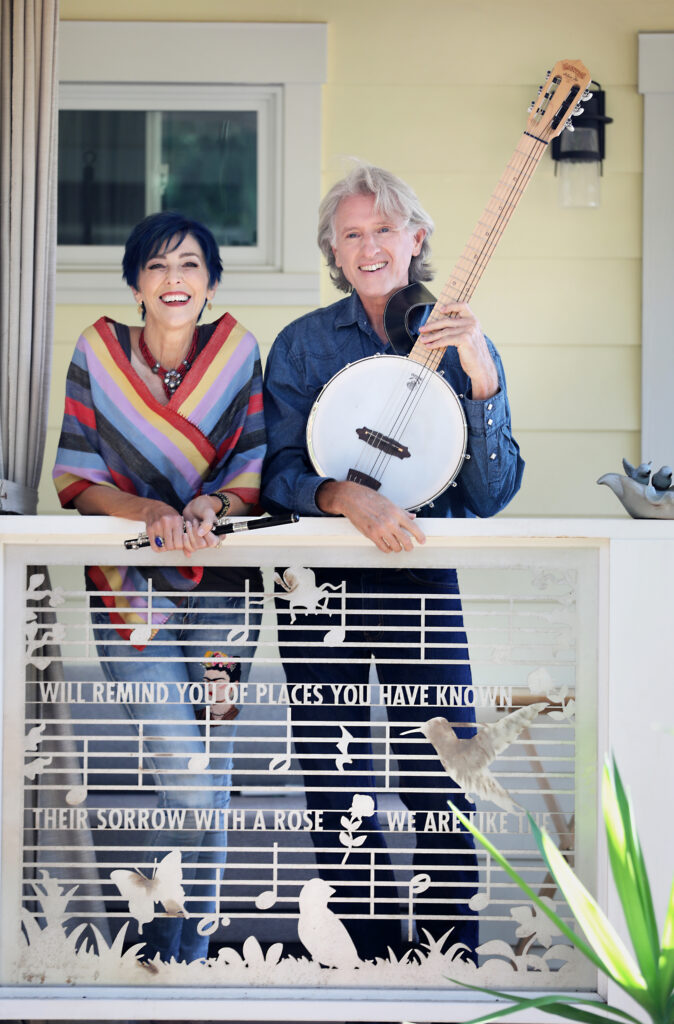
Volunteer Spotlight: Nell + Jim Band
Sharing food often nourishes connections and caring. Hilary Perkins and Jim Nunally believe sharing live music does the same thing. So they decided to do both for participants in our shelter services at Jonathan’s Place in San Rafael.
“We live here in San Rafael and seeing people in tents outside saddens us,” says Hilary, half of the duo who perform and record as the Nell + Jim Band. “We’re activists at heart. We asked ourselves ‘what could we do?’ “
They responded to a call for volunteers interested in helping with meals at Jonathan’s Place, where Homeward Bound of Marin provides shelter for up to 40 adults. Joined by friends, they delivered their first evening meal in January and brought instruments along.
“It was an amazing experience. People called ‘thank-you’ to us from across the room,” she says. One woman inched closer as they played and told Hilary, “I’m so used to not kindness. It’s so nice to be with people who are kind.”
Jonathan’s Place is the latest venue to benefit from their activism and talents. The couple operates a fledgling nonprofit called Whippoorwill Arts to promote roots music and its performers. Their Music aLIVE program offers paid gigs for musicians to play in non-traditional sites.
While Music aLIVE has chapters now in four states, our shelter is the first site where it brings music to people who are unhoused. Most performances happen in senior homes, prisons, schools or programs serving people with disabilities.
Their monthly visits with food and music on Friday nights have given them insights that will help them expand the music program with more community partners, Hilary says.
Each visit to Jonathan’s Place reinforces her belief that live music creates a unique exchange of stories, energy and goodwill.
“The love, kindness and attention to the music that we receive while we’re there enriches our lives,” she says. “We believe it’s healing for everyone.”
View full newsletter
This pdf is not accessible. For help reading it, please scroll up the page or contact Maura Thurman.
Previous
Fall/Winter 2022Next
Fall/Winter 2023
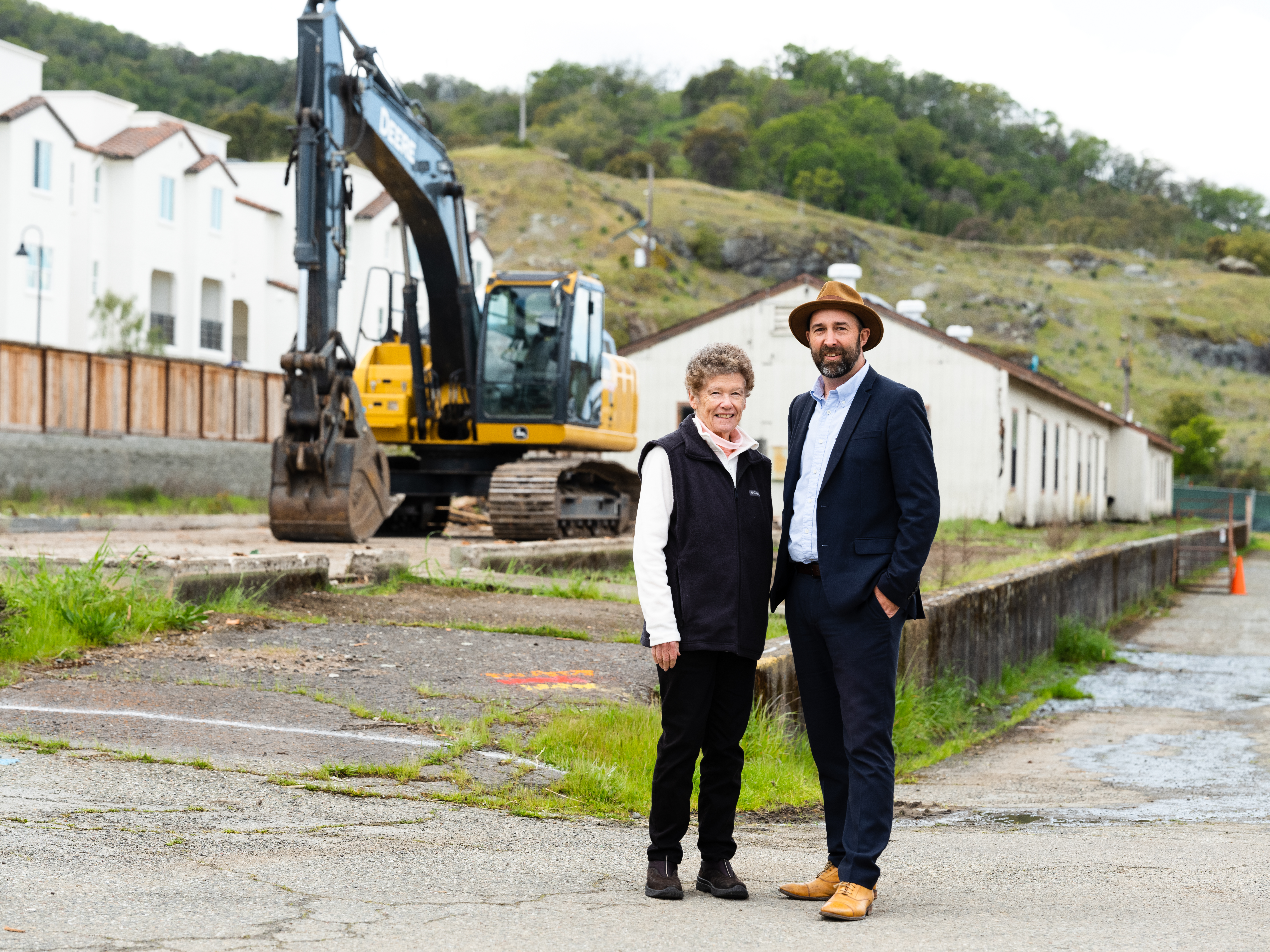


Social worker connects veterans to community
Helping unhoused veterans move to new homes and developing ways to keep them thriving make the days busy for Cynthia Gray, a clinical social worker for the U.S. Office of Veterans Affairs.
“I do home visits, meet with people in my office, talk to landlords, lead a support group,” says Cynthia, who works from our Novato campus. “One day can be very different from the next.”
Working with veterans identified as chronically homeless since 2012, Cynthia has a wealth of expertise in helping them obtain housing vouchers to subsidize rent through a federal program known as HUD/VASH.
“Some landlords are veteran-friendly,” Cynthia says, noting others may be less flexible on issues like a low credit score.
She also provides intensive wraparound support that may include communicating with doctors, developing safety plans in their homes or connecting them with organizations like Veterans and Equines Together.
“That group introduces veterans to horses. They can learn to care for the horses too,” Cynthia says. “I’ll do whatever works to coax people out of their homes. For people to make positive changes in their lives, they need meaningful relationships.”
Some veterans housed through her program meet with her only four times a year, while she may talk to others weekly.
“I’ve always loved hearing their different stories,” Cynthia says. “It’s super rewarding just to help people get a new lease on life.”
She sees her office at New Beginnings Center as a perfect nexus for all her activities.
“People at the shelter don’t have to travel to see me and I like working with the staff here. I’ve got great respect for what’s going on at Homeward Bound overall,” she says.
Being at New Beginnings Center brings her full circle, because she first worked after college in a large tent shelter operated by Homeward Bound before the shelter opened in 2000. Her supervisor was Bob Puett, who today leads our Board of Directors.
“The services have exploded in so many ways,” Cynthia says. “Back then, I felt like we were building the foundation.”